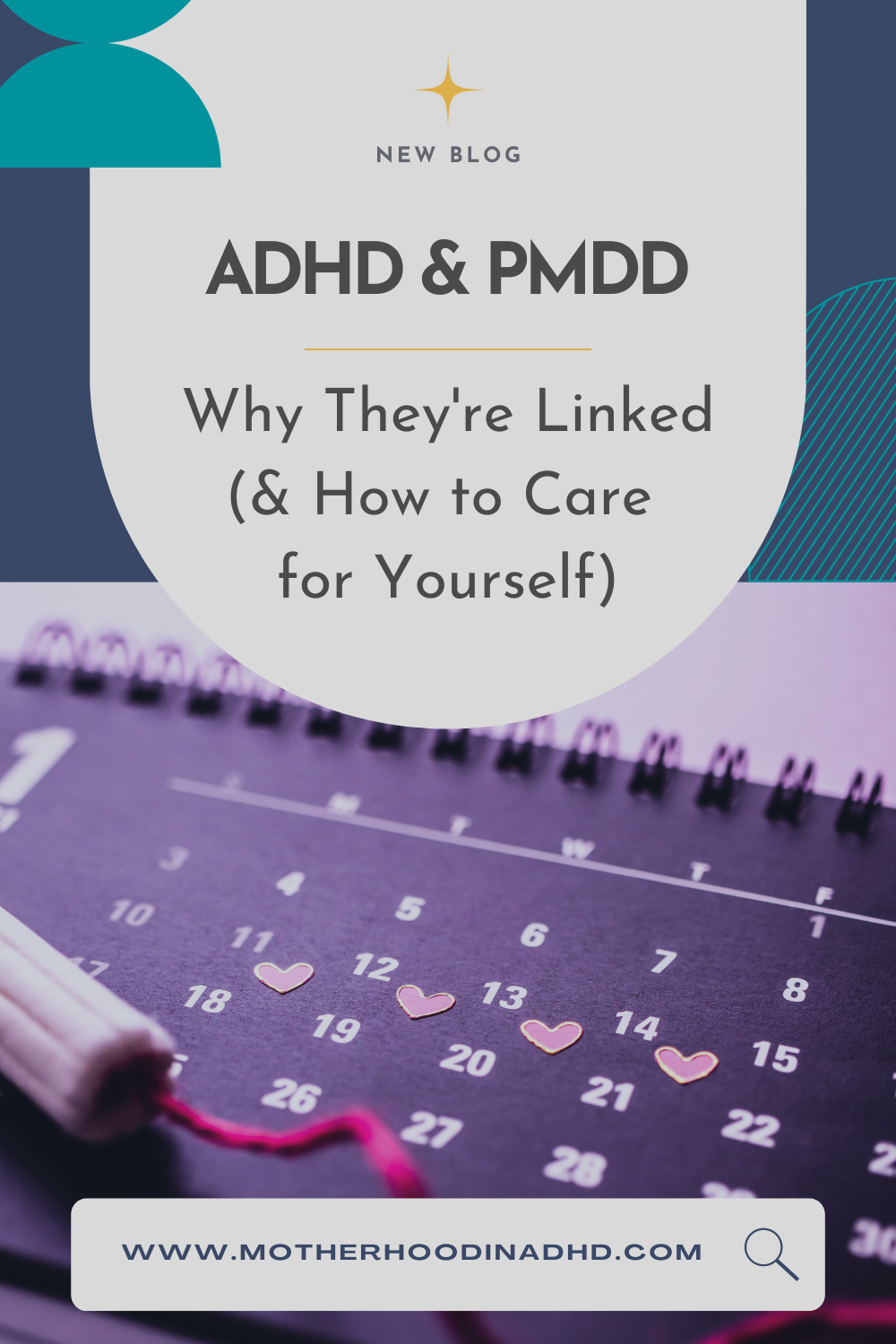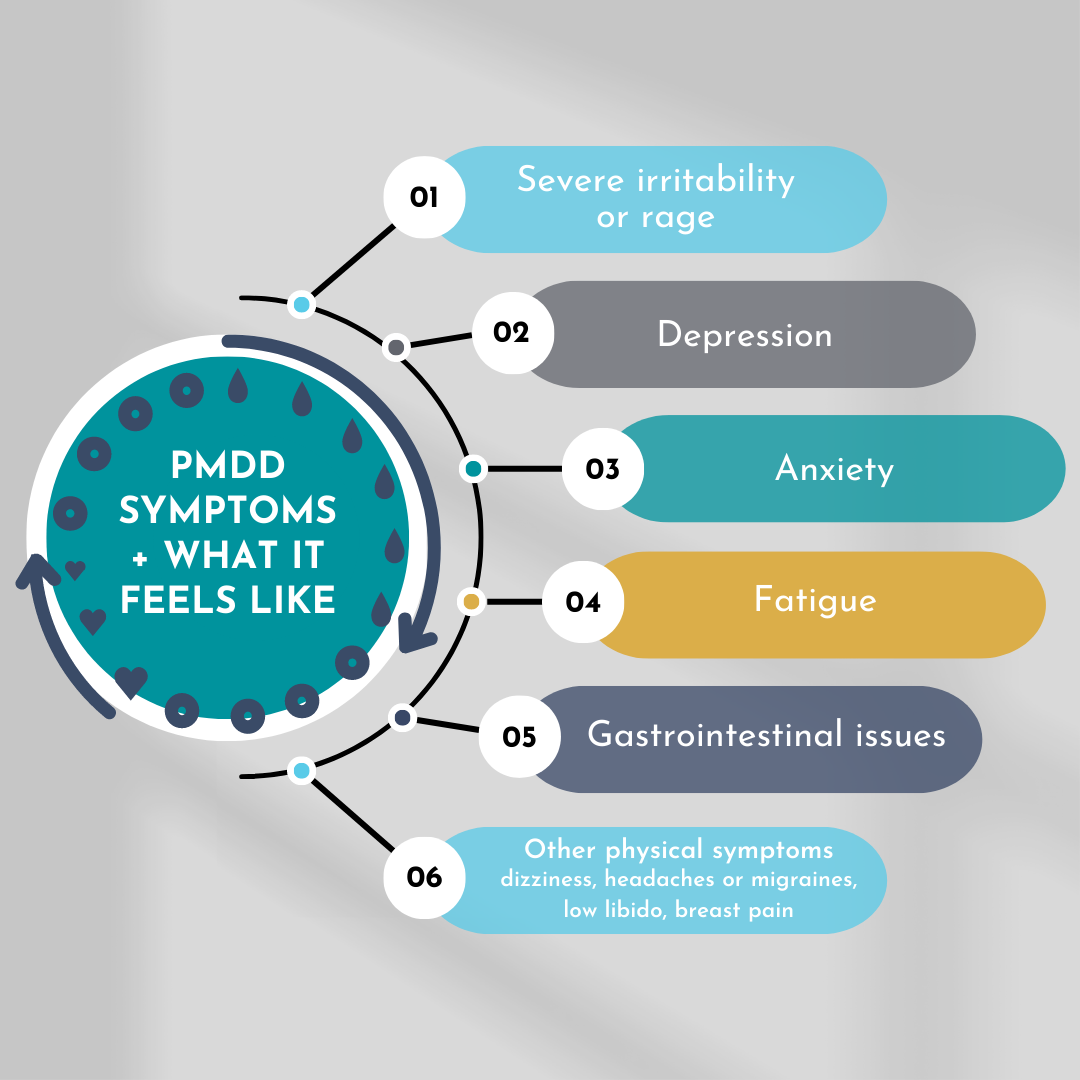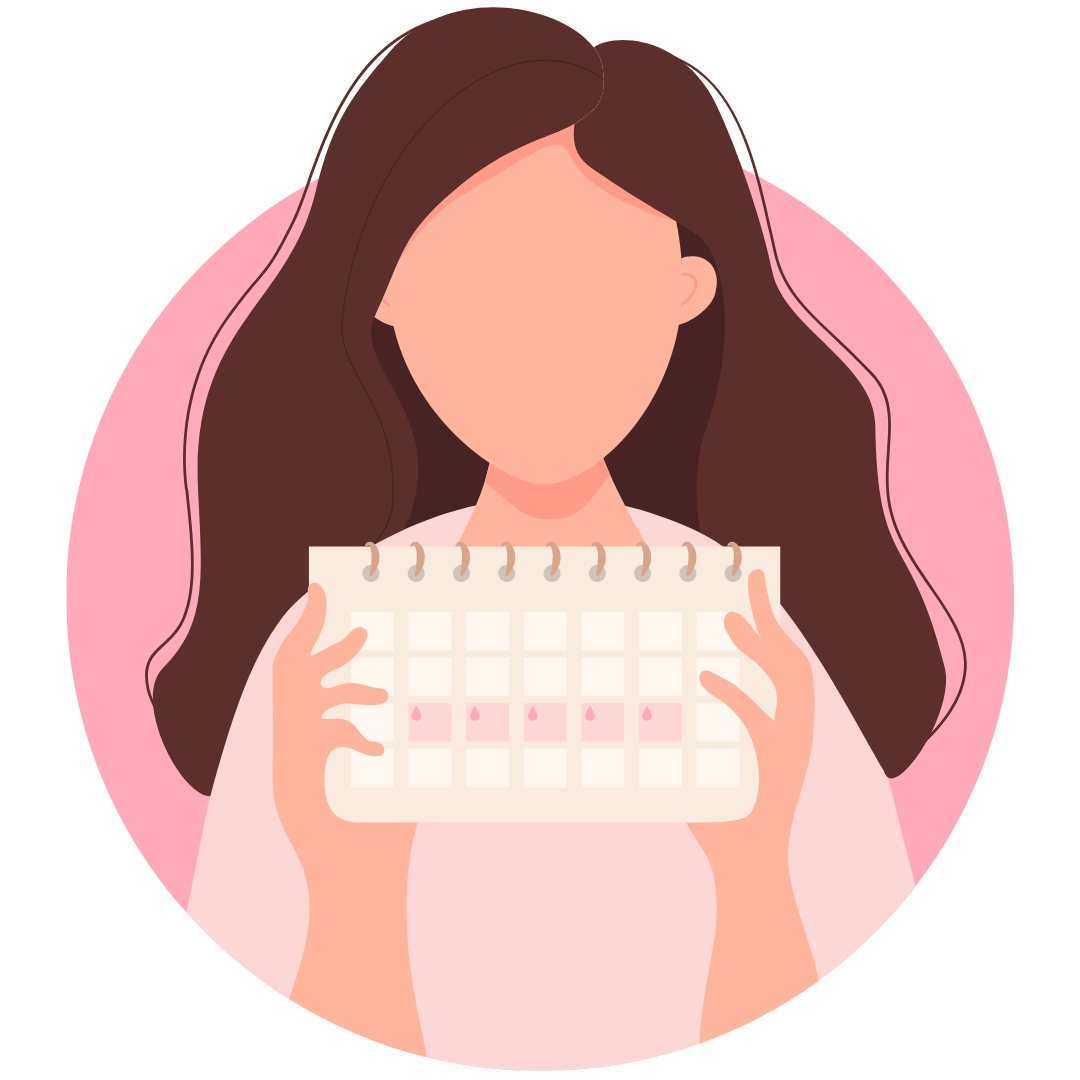ADHD & PMDD: Why They’re Linked (& How to Care for Yourself)
It’s only 5:30 PM, and you’re already annoyed by everyone and everything.
There’s another three hours before bedtime, and you’re not sure how you’ll make it.
You’ve already yelled like a lunatic at your kids or partner, burst into tears, and hid in the bathroom because you’re ashamed of how you’re treating them, and now you are contemplating if life is even worth living anymore.
But you’re not always like this.
It feels so unpredictable…
Or is it more like a cycle?
A couple of weeks out of the month you’re perfectly fine - but the last two feel like a gradual slide into a nightmare.
You feel irritable, anxious, and depressed, your stomach is twisted in knots and your headaches are at migraine level.
Your ADHD also feels worse at the end of each month - it's like your medication suddenly stops working.
If you relate to this scenario, you might have PMDD - Premenstrual Dysphoric Disorder - and research shows women with ADHD are more likely to have it.
So what exactly is PMDD, and how does it relate to ADHD?
In the post, we’ll answer these questions, outline your treatment options and give you the best tips for caring for yourself each month when your cycle rolls around.
Disclaimer: This article is not medical advice. If you’re experiencing symptoms of PMDD, please see a licensed medical practitioner. If have severe depression or thoughts of suicide, please seek help from your doctor immediately, or call/text 988 to reach the Suicide and Crisis Hotline.
What is PMDD? (Symptoms + What it Feels Like)
PMDD - Premenstrual Dysphoric Disorder - is a severe form of PMS (Premenstrual Syndrome) - but for many women, PMDD goes way beyond irritability during the week before your period.
PMDD occurs during the luteal phase of a woman’s menstrual cycle (2 weeks before your period starts), and may include any of the following symptoms:
Severe irritability or rage - this might look like flipping out or crying over minor inconveniences or yelling at loved ones while angry and then regretting it later
Depression - feelings of worthlessness, extreme sadness, not wanting to shower or engage in your normal activities, thoughts of suicide or harming yourself and/or others
Anxiety - feeling nervous for no reason, panic attacks, feeling like everyone hates you or is mad at you, worrying you’re a bad person, anxious thoughts about your appearance or body, blowing negative comments out of proportion, paranoia about what others are thinking about you
Fatigue - unexplained bouts of tiredness, insomnia, low-motivation
Gastrointestinal issues - stomach aches, cramps, bloating, diarrhea or constipation, nausea, vomiting
Other physical symptoms - dizziness, headaches or migraines, low libido, breast pain
You may experience other physical or mental symptoms with PMDD - this list is not exhaustive. Some of these symptoms may indicate another disorder or illness - so please follow up with your doctor if you’re experiencing any of them.
Can ADHD Make PMDD Worse?
Simply put, women with PMDD feel miserable during the luteal phase of their cycle. But what if you have both ADHD and PMDD? Are the two disorders related?
A recent study suggests that the prevalence of PMDD is higher in women with ADHD than in the general population - so if you have ADHD, you're more likely to have PMDD.
As an adult with ADHD, you already struggle with inattention, distractibility, forgetfulness, and emotional sensitivity/dysregulation.
PMDD magnifies all of these symptoms - making you feel helpless to manage your ADHD, even when you’re being treated with medication and/or therapy.
Why Does PMDD Affect ADHD Symptoms?
PMDD isn’t widely studied, and more research is needed on the disorder in both the general population of women and women with ADHD.
Although we don’t have definitive answers about why PMDD affects ADHD, there are a few theories.
Hormonal Effects on Mood and Cognition
The hormone estrogen stimulates the production of neurotransmitters dopamine, serotonin, and norepinephrine in your body. These neurotransmitters play a key role in regulating mood, memory, and cognition.
Women with ADHD already struggle with inattention, memory, and mood regulation, so it's possible the rapid decline of estrogen during the luteal phase of the menstrual cycle could cause these issues to worsen.
Progesterone may also be a factor - one theory suggests some women’s brains have an adverse reaction to this hormone, causing them to experience anxiety and depression.
Hormonal Effects on Stimulant Medication
Do you take a prescribed stimulant medication like Adderall, Vyvanse, Focalin, or Ritalin to treat your ADHD?
If so, it may be less effective during your luteal phase for the same reasons mentioned above. Stimulants work by either increasing the release of neurotransmitters in the brain or preventing or delaying their reuptake.
Because estrogen helps stimulate the production of these neurotransmitters, your meds may not work as well when estrogen crashes before your period.
Sensory and Emotional Sensitivity
ADHD symptoms go beyond inattention, forgetfulness, and impulsivity. Many ADHDers report feeling more emotionally sensitive than their peers, as well as a higher sensitivity to sensory stimuli.
This sensitivity magnifies the physical and emotional symptoms of PMDD, making them unbearable.
Rejection Sensitivity
Do you react strongly to rejection? Does any negative comment feel like a knife through your heart?
People with ADHD often report extreme sensitivity to rejection or criticism. So the combination of preexisting rejection sensitivity and low hormone levels during your premenstrual phase can worsen feelings of anxiety and depression when interacting with others.
Comorbidities
Dealing with symptoms of ADHD, especially untreated, can lead to depression and anxiety. But people with ADHD can also have depression or anxiety as separate disorders.
If you have depression or anxiety along with your ADHD, these symptoms may worsen when your estrogen levels drop.
Treatment Options for PMDD & ADHD
Because research on PMDD is sparse, treatment options are limited - but there is hope. Here are the most common treatments for PMDD.
Hormonal Birth Control
Hormonal birth control works by preventing ovulation - so if you aren’t ovulating, your hormones aren’t fluctuating the way they normally do.
This might ease your PMDD symptoms - or they could make them worse. Usually, birth control pills include 5 days of “inactive” pills (sugar pills) - and during that time, women have a “period” - which is actually called withdrawal bleeding.
PMDD symptoms could resurface during your withdrawal bleeding phase.
Antidepressants
Antidepressants have shown some efficacy in treating PMDD by increasing the neurotransmitter serotonin in the brain.
The most commonly prescribed antidepressants for PMDD are called SSRIs - Selective Serotonin Reuptake Inhibitors. These include (but aren’t limited to):
Fluoxetine (Lexapro)
Sertraline (Zoloft)
Citalopram (Celexa)
Escitalopram (Prozac)
Stimulant Medications
If you aren’t already taking a stimulant medication such as Adderall, Vyvanse, Focalin, or Ritalin, these may help treat your ADHD symptoms during your luteal phase (or your entire cycle if you take them daily).
Medications can be super helpful in treating your ADHD symptoms - but they aren’t a magic wand. Learning ADHD-centered tools can help you manage your life in a way that makes sense for the unique way your brain works. Grab my free resource: How to Manage ADHD Beyond Medication.
Holistic Health & Lifestyle Changes
Many women with ADHD choose to take a holistic route to treat their PMDD. A holistic approach may include:
Eating an anti-inflammatory diet - eliminating foods such as gluten, soy, dairy, nightshades, etc., lowers the workload on your body which allows your body to use its resources for other things, like improving your overall health and balancing your hormone levels, which in turn lowers your stress level.
Taking supplements - Zinc, B vitamins, calcium, magnesium, probiotics, curcumin, and other vitamins and minerals may help ease symptoms if you have a deficiency.
Exercise - Exercise elevates your mood by increasing dopamine and serotonin in your brain after a workout.
Stress Reduction - Stress has a negative effect on your overall health and well-being, and your health coach or naturopathic doctor can help you develop ways to reduce stress in your daily life.
Interested in learning more about holistic treatment of PMDD? Episode 127 of the Motherhood in ADHD podcast features naturopath Heidi Hogarth, and we discuss dietary and lifestyle changes to help ease PMDD naturally. Click to listen!
Self-Care & Life Management Tips for When PMDD Hits
We’ve discussed all your options for reducing symptoms of PMDD, but in the meantime - how do you care for yourself when PMDD hits you like a freight train every month? Here are a few tips.
Cycle Tracking & Syncing
In episode 127 of the Motherhood in ADHD podcast, naturopath Heidi Hogarth strongly recommends tracking your cycle each month using an app or calendar.
Why? Because when you know what to expect from your hormones and mood, you can use that information to plan your activities (called cycle-syncing).
During the follicular phase of your cycle - the first day of your period up until ovulation - tends to come with higher mood and energy levels. Use these two weeks to tackle difficult projects or social activities that require energy and focus.
The luteal phase is where hormones start to slide downhill for women with PMDD. Estrogen drops and progesterone rises, potentially causing depression, anxiety, and other PMDD symptoms. Try to plan lower-stress activities during these weeks, and schedule rest and time to take care of yourself. Relaxing activities such as massage, hot baths, reading or meditating, or simply watching your favorite shows on Netflix are great ways to slow down during this time of the month.
Talk to Your Friends & Family About Your PMDD
Simply talking to your partner, family, friends, and trusted coworkers helps reduce the guilt and shame that comes with PMDD.
When you mark your luteal phase on a family calendar, your partner and kids know you’ll need extra support from them during those days. Tell them what you need during that time period - whether it’s more alone time, help around the house, or an extra dose of love, affection, and compassion.
Learn more about living happily, even with PMDD
Want to live easier with PMDD & ADHD? Watch the ADHD Energy Recharge: A fast-paced, mom-friendly workshop so you can harness your natural rhythms, both during the day and during your cycle, to feel energized, productive, and social, when you have big energy… and rest when you just can’t be around people anymore!
Get alotta crap done when you've got energy.
Rest when you don't - without feeling guilty!
Sign up today!
See Your Doctor About Your ADHD & PMDD
If you’re experiencing symptoms of PMDD, don’t suffer in silence. Contact your general practitioner or holistic health provider to learn about your treatment options.
If you haven’t yet been diagnosed with ADHD, seeking guidance from a doctor can help you manage ADHD symptoms that worsen during your cycle.
If you’re on the fence about seeking an ADHD diagnosis, check out our free resource: ADHD in Women: A Checklist of Symptoms. You’ll learn about why ADHD presents differently in women and what symptoms might look like. The checklist is printable and customizable, so you can add your unique symptoms and take it with you to talk to your doctor.




